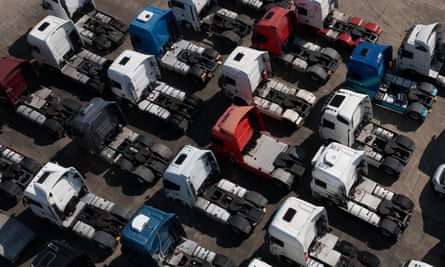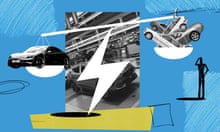Hydrogen is a beguiling substance: the lightest element. When it reacts with oxygen it produces only water and releases abundant energy. The invisible gas looks like a clean fuel of the future. Some of the world’s top automotive executives are hoping it will dethrone the battery as the technology of choice for zero-emissions driving.
Our EV mythbusters series has looked at concerns ranging from car fires to battery mining, range anxiety to cost concerns and carbon footprints. Many critics of electric vehicles argue that we should not ditch petrol and diesel engines. This article asks: could hydrogen offer a third way and overtake the battery?
The claim
Many of the strongest claims for hydrogen’s role in the automotive world come from chief executives at the heart of the industry. Japan’s Toyota is the most vocal proponent of hydrogen, and its chair, Akio Toyoda, last month said he believed the share of battery cars would peak at 30%, with hydrogen and internal combustion engines making up the rest. Toyota’s Mirai is one of the only hydrogen-powered cars that is widely available, alongside the Nexo SUV from South Korea’s Hyundai.
Oliver Zipse, the boss of the German manufacturer BMW, said last year: “Hydrogen is the missing piece in the jigsaw when it comes to emission-free mobility.” BMW may be investing heavily in battery technology but the company has its BMW iX5 Hydrogen fuel cell car in testing – albeit using Toyota fuel cells. Zipse said: “One technology on its own will not be enough to enable climate-neutral mobility worldwide.”
The science
Hydrogen is the most abundant element in the universe but that does not mean it is easy to come by on Earth. Most pure hydrogen today is made by splitting carbon from methane, but that produces carbon emissions. Zero-emissions “green hydrogen” comes from electrolysis: using clean electricity to split water into hydrogen and oxygen.
To use hydrogen as a fuel it can be burned, or it can be used in a fuel cell: the hydrogen reacts with the oxygen from the air in the presence of a catalyst (often made from expensive platinum). That strips electrons that can run through an electric circuit, charging a battery that can power an electric motor.
Hydrogen offers refuelling in four minutes, higher payloads and longer range, according to Jean-Michel Billig, the chief technology officer for hydrogen fuel cell vehicle development at Stellantis. (The Mirai goes 400 miles on a fill-up.) Stellantis, which last month started production of hydrogen vans in France and Poland, is targeting businesses that want vehicles in constant use and do not want the downtime required for charging.
“They need to be on the roads,” Billig said. “A taxi not running is losing money.”
Stellantis thinks it can drive the sticker price down. Billig said that he expected by the “end of this decade, hydrogen mobility or BEV will be equivalent from a cost perspective” – although the company will make both.
Many energy experts do not share the enthusiasm of the hydrogen carmakers. The Tesla boss Elon Musk describes the tech as “fool sells”: why use green electricity to make hydrogen when you can use that same electricity to power the car?
Every transformation of energy involves wasted heat. That means that hydrogen fuels inevitably deliver less energy to the vehicle. (Those losses increase much further if the hydrogen is burned directly or used to make e-fuels that can replace petrol or diesel in a noisy, hot internal combustion engine.)
David Cebon, a professor of mechanical engineering at the University of Cambridge, said: “If you use green hydrogen it takes about three times more electricity to make the hydrogen to power a car than it does just to charge a battery.”
That could improve slightly but not enough to challenge batteries. “It’s difficult to do very much better,” Cebon said.
Michael Liebreich, the chair of Liebreich Associates and the founder of the analyst firm Bloomberg New Energy Finance, created an influential “hydrogen ladder” – a league table ranking hydrogen uses on whether there are cheaper, easier or more likely options. He placed hydrogen for cars in “the row of doom”, with very little chance of even a niche market.
Can hydrogen overtake batteries in cars? “The answer is no,” said Liebreich, without a moment’s hesitation. Carmakers betting on a large share for hydrogen are “just wrong”, and heading for an expensive disappointment, he added.
The key problem for hydrogen cars is not the fuel cell but actually getting the clean hydrogen where it is needed. The gas is highly flammable – with all the safety concerns that entails – must be stored under pressure and leaks easily. It also carries less energy per unit volume than fossil fuels, meaning it would require many times more tankers unless on-site electrolysers are used.
Investments are coming in hydrogen supplies, with heavy government subsidies in the US and Europe. But so far there has been a chicken-and-egg problem: buyers don’t want hydrogen cars because they can’t fill them, and there are no filling stations because there are no cars. Across Europe there are 178 hydrogen filling stations, half of which are in Germany, according to the European Hydrogen Observatory. Compare nine UK hydrogen stations with 8,300 petrol stations or 31,000 public charging locations (not counting plugs at homes).
Any caveats?
So why does the International Energy Agency think that hydrogen will account for 16% of road transport in 2050 in its pathway to net zero? The answer lies mostly with bigger vehicles such as buses and lorries.
Liebreich said he was convinced that batteries would still dominate energy supply for heavy goods vehicles – to the point of co-founding a lorry charging company. “There might be some hydrogen in HGVs but it will be the minority,” he said.
Even Toyota acknowledges that hydrogen in cars has so far “not been successful”, mainly because of the lack of fuel supply, according to its technical chief, Hiroki Nakajima, speaking to Autocar in October. Lorries and long-distance buses offer a better hope for the technology, although it is also prototyping a hydrogen version of its Hilux pickup truck.

The verdict
The economics of hydrogen will change as governments’ enthusiasms wax or wane. Other things could change: technology could improve (within limits) and make the gas more attractive, and prospectors may be able to find cheaper “white hydrogen” drilled from the ground.
Yet for cars the die appears to be cast: batteries are already the post-petrol choice for almost every manufacturer. In the UK there have been fewer than 300 sales of hydrogen vehicles over 20 years, compared with 1m electric cars, according to the Society of Motor Manufacturers and Traders.
Batteries’ domination is likely to be extended as the money pouring into research and infrastructure addresses questions of range and charging times. Compared with that flood of investment, hydrogen is a trickle.
Hydrogen’s advocates now face the question of whether they can build profitable businesses in longer-distance, heavy-duty road transport. They need an answer soon on where they will source enough green, cheap hydrogen – and whether the gas would be better used elsewhere.







